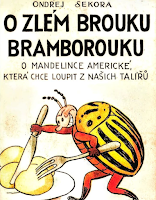Poznańskie Muzeum Pyry - The Poznań Spud Museum
After booking a visit to The Poznań Potato Museum
I found the tour was not available in English*, so I would need to translate as best I can for my family. Which, considering I struggle to understand spoken Polish at normal speed, will probably result in me making it up as I go along. But: best foot forward; I shall do my best.
(*The reply from the museum said the tour was mainly in Polish, which is fair enough considering the Museum is situated in Poland)
A bit of advance preparation is needed, so I will note some spud related vocabulary here. I first learned that Ziemniak is the word for potato, but just as we have spuds, tatties, and taters, the Polish have other words for potato. There is the Germanic word kartofel, but in the Poznań area the dialect word pyra is used, pyry being the plural, but also the genitive singular.
What other vocabulary may crop up?
uprawa / uprawy - crop / crops
uprawiać - to grow / cultivate
uprawa polowa - field crop
bulwa - tuber
skrobia - starch
skrobiowy - starchy
pęd / pędu / pędowi / pędem / pędzię - shoot
pędy / pędów / pędom / pędami / pędach - shoots
wypuszczać - release (like shoots)
roślina - a plant
roślina uprawna - cultivated plant
psianka / psianek - nightshade
wywodzić się z... - to originate / come from...
tysiące lat temu - thousands of years ago
podstawowy - basic / staple
składniki - ingredients
jadłospis - menu / bill of fare / dishes that constitute daily food
pole / pola / polu / polem - field
pola / pól / polom / polami / polach - fields
Regarding the story of the potato in Poland, we might start with Jan III Sobieski, King of Poland and Grand Duke of Lithuania from 1674 until his death in 1696. He is often credited with the introduction of potatoes to Poland, sending a sack of potatoes to his wife Marysieńka during the Vienna siege / Battle of Vienna (the latter is in the correct period). His royal gardener, Wieńczarek, planted potato tubers in the gardens of Wilanów Palace.
worek - sack
oblężenie - siege
bitwa - battle
Wiednia - Vienna
Bitwa pod Wiedniem - Battle of Vienna
dotrzeć - reach / arrive by effort
XVII - siedemnasty - 17th
XVIII - osiemnasty - 18th
XIX - dziewiętnasty - 19th
wiek / wieku / wiekowi / wiekiem - century
przywieźć - to bring back / deliver something (perfective form)
zasadzić - to plant
pałac - palace
Countries, peoples and geogarphy in Polish potato history:
Ameryka Południowa - South America
Niemcy - Germany
Czechosłowacja -
Czechy - Czechia / Czech Republic / Bohemia
kraj - country
granica - border
Hiszpanie - Spaniards
Despite conservative opposition, the popularity of potatoes grew.
Pomimo... [+genitive] - despite...
mimo... [+genitive] - despite...
trudności - difficulties
konserwatywna
opozycja
nieufność - mistrust / suspicion
traktować - to treat / deal / handle something in a specific way
nowinka - novelty
upowszechnić się - to become popular
stać się - to become (pf.)
The scourge of the potato in Ireland and the UK may be potato blight, zaraza ziemniaczana, but in Poland and neighbouring countries, it is the Colorado potato beetle, stonka.
The Beetle is likely to have spread with movement of people, but in the post war period where East Germany and Poland were in the Soviet Sphere of Influence, also know as the Eastern Bloc, propaganda was spread claiming the Beetles were dropped by Western Aircraft. I know: a Soviet government lying to their people to demonize countries beyond their influence, who'd have thought it?
żółty - yellow
rysunek - shape
plam - mark / stain
kremowy - cream colour
czarny - black
pasek - stripe
paski / pasków / paskom / paskami / paskach - stripes
pasiasty - striped
odkryty - discovered / found (adjective)
spodować - to cause
został - to become (but also to remain or be left)
naturalny wróg - natural enemy
niewielka ilość - insignificant quantity
sprzyjać - to favour
Sprzyjały temu... - It was favoured by... / In its favour were...
Wielka Wojna - The Great War
Druha wojna Światowa - WWII
The propaganda was also spread by the Ministry of Agriculture and Agricultural Reforms, Ministerstwa Rolnictwa i Reform Rolnych in 1950 in the columns of the People's Tribune (na łamach Trybumy Ludu), claiming huge amounts of the beetles were dropped by American planes.
ogromny - huge / immense
ilość - quantity
ilości - quantities
samoloty / samolotów / samolotom / samolotami / samolotach - planes
maszyny - machines / craft. Often used after first establishing what the craft is.
stonkowate - leaf beetle
rodzina stonkowatych - leaf beetle family
chrząszcz - beetle
żuk - beetle
rozprzestrzeniać się - to spread
NRD - Niemiecka Republika Demokratyczna
Niemiecka Republika Demokratyczna - German Democratic Republic
German Democratic Republic - East Germany
latać - to fly
przelatywać - to fly over / through / by, to arrive by flying
przelatujący - active adjectival participle - (over) flying
przelatujące maszyny - flying machines / machines that are flying over
ciężki - heavy




Thanks for talent for connecting with readers on a personal level. Keep writing.
ReplyDelete